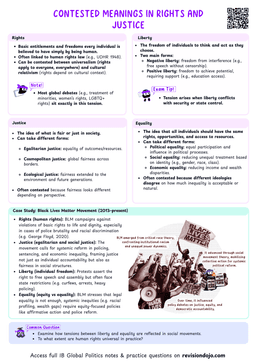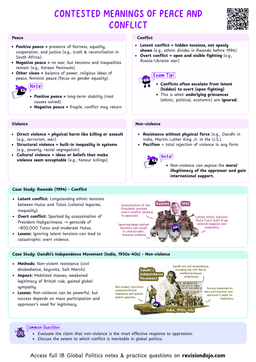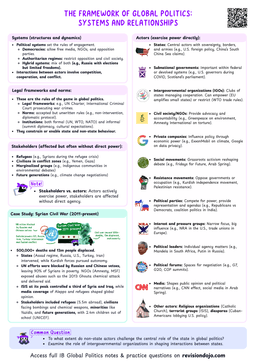The Role of Private Companies in Global Politics
- Private companies, especially multinational corporations (MNCs), play a role in upholding or violating workers' rights. Power imbalances between employer and employee can lead to exploitation.
- UN Guiding Principles on Business and Human Rights: Clarifies state, employer, and employee responsibilities to uphold rights at work:
- State: Enact/enforce laws to protect workers.
- Employer: Prevent, act on, and address workplace abuse.
- Employee: Know and exercise rights, seek help if violated.
- Marxist perspective: Capitalism prioritizes profit over worker welfare, workers are a vulnerable group. Marxists often criticize global institutions like the UN for failing to challenge corporate power.
1. Economic Powerhouses
- Multinational Corporations (MNCs) like Apple, Amazon, and ExxonMobil have revenues that rival the GDP of entire countries.
- Their economic influence allows them to shape global markets, supply chains, and trade policies.
- In 2020, Walmart's revenue was approximately $559 billion, surpassing the GDP of countries like Sweden and Argentina.
2. Political Influence
- Private companies lobby governments, fund political campaigns, and participate in policy-making.
- They often advocate for regulations that favor their interests, such as tax incentives or deregulation.
- The tech industry has lobbied extensively against data privacy regulations in the European Union, highlighting the tension between corporate interests and public policy.
3. Global Governance
- Companies play a role in global governance by participating in international agreements and initiatives.
- For example, many corporations have committed to the United Nations Sustainable Development Goals (SDGs), addressing issues like climate change and poverty.
- Some businesses also collaborate with IGOs and NGOs to promote human rights, sustainability, and ethical practices in supply chains.
- Nestlé has partnered with the Fair Labor Association to improve labor rights and monitor conditions in its cocoa supply chain.
- While private companies contribute to economic growth and innovation, their influence can also lead to ethical concerns, such as tax avoidance, labor exploitation, and environmental degradation.
The Role of Unions in Global Politics
1. Advocates for Workers' Rights
- Unions represent workers in negotiations with employers, advocating for fair wages, safe working conditions, and job security.
- They play a crucial role in balancing the power dynamics between labor and capital.
- The International Trade Union Confederation (ITUC) represents over 200 million workers worldwide, advocating for labor rights at the global level.
2. Political Engagement
- Unions often engage in political activities, such as lobbying for labor-friendly legislation or supporting political candidates.
- They can influence policy decisions on issues like minimum wage laws, healthcare, and workers' rights.
- In the United States, unions like the AFL-CIO have been instrumental in advocating for policies such as the Family and Medical Leave Act.
3. Global Solidarity
- Unions collaborate across borders to address transnational issues like supply chain labor abuses and corporate accountability.
- They often work with NGOs and international organizations to promote workers' rights globally.
- Unions face challenges such as declining membership, anti-union legislation, and the rise of the gig economy, which often lacks traditional labor protections.
The Interplay Between Private Companies and Unions
1. Collective Bargaining
- Unions negotiate with private companies to secure better wages and working conditions for employees.
- This process can lead to mutually beneficial agreements but also to conflicts and strikes if negotiations break down.
- In 2019, the United Auto Workers (UAW) union went on strike against General Motors, resulting in a new contract that included wage increases and improved benefits.
2. Regulatory Influence
- Both private companies and unions lobby governments to shape labor laws and regulations.
- Companies may advocate for deregulation, while unions push for stronger worker protections.
- This dynamic creates a tension between economic efficiency and social justice, highlighting the complex relationship between labor and capital.
3. Global Supply Chains
- In a globalized economy, unions often focus on improving labor conditions in supply chains, while companies seek to minimize costs.
- This has led to initiatives like the Bangladesh Accord on Fire and Building Safety, which brought together unions, companies, and NGOs to improve factory conditions.
- When analyzing the relationship between private companies and unions, consider the broader economic, political, and social context.
- This includes factors such as globalization, technological change, and shifting labor markets.
Challenges and Opportunities
- Challenges for Unions:
- Declining Membership: Union membership has declined in many countries due to factors like automation, outsourcing, and the rise of the gig economy.
- Anti-Union Policies: Some governments and companies implement policies that weaken unions, such as right-to-work laws or restrictions on collective bargaining.
- Opportunities for Collaboration:
- Corporate Social Responsibility (CSR): Some companies partner with unions to promote ethical labor practices and sustainability.
- Global Framework Agreements: These agreements between multinational companies and global union federations set standards for labor rights across supply chains.
- The agreement between IKEA and the global union federation IndustriALL ensures fair labor practices in the company's supply chain.
The Broader Impact on Global Politics
- Economic Inequality:
- The relationship between private companies and unions affects economic inequality.
- Strong unions can help reduce inequality by securing higher wages and benefits for workers.
- Democratic Governance:
- Unions contribute to democratic governance by giving workers a voice in political and economic decision-making.
- However, the decline of unions in some regions has raised concerns about the erosion of worker representation.
- Globalization and Labor Rights:
- Globalization has created both challenges and opportunities for unions and companies.
- While companies benefit from global markets, unions must navigate complex supply chains to protect workers' rights.
- How do private companies and unions influence global politics differently?
- What are the key challenges facing unions in the 21st century?
- How can private companies and unions collaborate to address global issues like climate change and labor rights?


